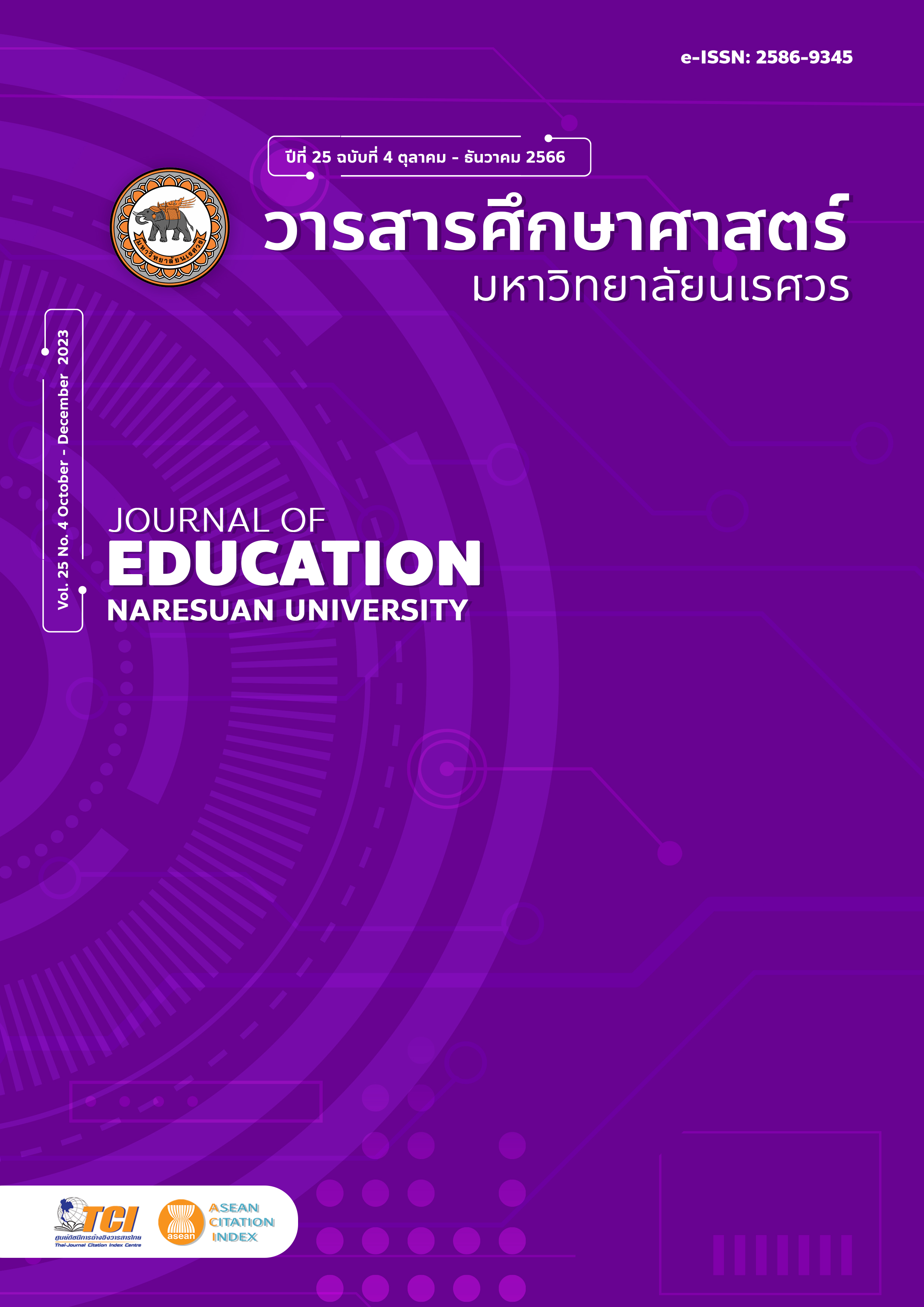EFFECTIVENESS OF ADAPTIVE ENGLISH LEARNING MANAGEMENT ACCORDING TO STUDENTS’ LEARNING STYLES AND PERSONALITY TRAITS
Main Article Content
Abstract
To design an effective learning management, it is necessary to consider the learners' learning style as an important part. The purposes of this research were 1) to study learning styles based on perceptual pathways and learning styles according to the students’ personality, 2) to develop and assess the effectiveness of learning management activities based on perceptual pathways and students’ personality, and 3) to assess students’ satisfaction towards learning activities. The sample was 1st year students who enrolled English for Self-direction course, consisting of 22 students. The experimental plan was a single group evaluated before and after the experiment. The duration of the experiment was 15 weeks. The research instruments consisted of 1) the learning style test of students classified by perceptual pathways and personality, 2) the activity plan for adaptive learning according to the perceptual pathways and personality of the students, 3) the student achievement evaluation form, and 4) the student satisfaction evaluation form. The quantitative data was analyzed by finding means, percentage and effectiveness. The findings of the research indicated as following: 1) students' learning styles categorized by perceptual pathways showed that students had a visual learning style of 75.97 percent and learning styles according to personality types was found that 90% of students were dependent personality, 2) learning management plan consisted of learning objectives, learning activities and measurement and evaluation of learning. The result of the effectiveness of learning management according to the learning style of the learners indicated that post-learning was higher than pre-learning with the effectiveness of pre-learning at 0.25 and post-learning at 0.72, and 3) The students were satisfied with the learning management according to the learning style of the learners at a high level with an average of 4.31 from 5 ( = 4.31, SD = 0.45).
Article Details

This work is licensed under a Creative Commons Attribution-NonCommercial-NoDerivatives 4.0 International License.
The owner of the article does not copy or violate any of its copyright. If any copyright infringement occurs or prosecution, in any case, the Editorial Board is not involved in all the rights to the owner of the article to be performed.
References
Barbe, W. B., & Swassing, R. H. (1979). Teaching through modality strengths: Concepts and practices. Columbus, Ohio: Zaner Bloser.
Changthong, J. (2016). Learning styles of students in information science and library science Faculty of Arts Silpakorn University. Nakhon Pathom: Silpakorn University. [in Thai]
Chinaphong, T. (2019). Learning styles among undergraduate physical education and sports science students, North Bangkok University. CMU Journal of Education, 2(2), 23-33. [in Thai]
Goodman, N. R. (1994). Cross-cultural training for the global executive. In R. W. Brislin & T. Yoshida (eds), Improving Intercultural Interactions. Thousand Oaks, CA: Sage.
Grasha, A. W., & Reichman, S. W. (1975). Learning style diagnostics the Grasha and Reichman student learning style scale. Ohio: Faculty Resource, University of Cincinnati.
Iaosanurak, C., Chunlasewok,C., Buabangplu,and, P., & Suksangprasit, J. (2017). The relationships between genders’ subject academic achievement and personality with learning style of student teachers. Journal of Graduate Studies Valaya Alongkron Rajabhat University, 11(1), 33-43. [in Thai]
Intakaew, A., Naiyapat, O., & Chansem, A. (2017). A study of English language learning styles of Thai undergraduates: A mixed method research. Research Methodology and Cognitive Science, 15(1), 36-53. [in Thai]
Khemmani, T. (2008). Learning style. Bangkok: The Publisher of Chulalongkorn University. [in Thai]
Kolb, D. A. (1984). Experiential learning: Experience as the source of learning and development. Englewood Cliffs, NJ: Prentice Hall.
Kolb, D. A., Rubin, I. M., & Osliand, J. (1991). Organization behavior reader. Englewood Cliffs, NJ: Practice-Hall.
Nimmanasutthi, D. (1992). Study of English language learning of students at the level of vocational diploma in the department of criminology, department of educational studies (Master thesis). Bangkok: Chulalongkorn University. [in Thai]
Nuampong, D. (2002). Problems of teaching English and needs for professional development of English language teachers at the mattayomsuksa 1 level in educational opportunity expansion schools. Nakhon Ratchasima: Nakhon Ratchasima Provincial Primary Education Office. [in Thai]
Phoothong, L. (2009). Model of English language teaching and learning in primary schools in the upper northern region. Chiang Mai: Faculty of Liberal Arts, Maejo University. [in Thai]
Prapphal, K. (2003). English proficiency of Thai learners and directions of English teaching and learning in Thailand. Journal of Studies in the English Language, 1, 6–12. [in Thai]
Rattanaphon, P. (1998) A study of learning and English learning strategies of mathayomsuksa 5 students of Triam Udom Suksa School, Bangkok Metropolis (Master thesis). Bangkok: Chulalongkorn University. [in Thai]
Sprenger, M. B. (2008). Differentiation through learning styles (2). California: Corwin Press.
Sriwattana, S. (2013). A Study of the learning styles of students studying Thai as a foreign language at National University of Singapore (Master thesis). Bangkok: Graduate School. [in Thai]
Thamabut, M. (2007). Learning styles. Retrieved March 2, 2012, from http://www.oknation.net/blog/nam-peth [in Thai]
Tomyay, R., & Thompson, M. (1982). Strategies for teaching nursing (2nd ed.). New York: John Wiley & Sons.
Witkin, H. A., Moore, C. A., Goodenough, D. R., & Cox, P. W. (1977). Field-dependent and field-independent cognitive styles and their educational implications. Review of Educational Research, 47(1), 1–64. https://doi.org/10.2307/1169967
Yusap, B. (2012). The Development of tertiary students’ English language learning autonomy through English for communication and study skills course. SDU Research Journal, 8(2), 189-204. [in Thai]


